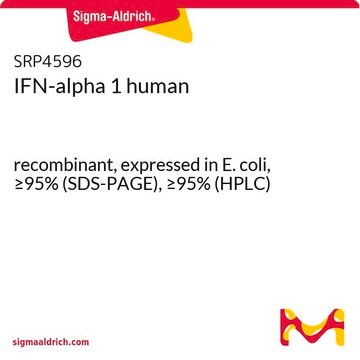T9157
Tryptose Phosphate Broth
suitable for insect cell culture
Synonyme(s) :
Tryptose Broth
Se connecterpour consulter vos tarifs contractuels et ceux de votre entreprise/organisme
About This Item
Code UNSPSC :
41106507
Nomenclature NACRES :
NA.73
Produits recommandés
Source biologique
bovine milk
Forme
solid
Technique(s)
cell culture | insect: suitable
Conditions d'expédition
ambient
Température de stockage
room temp
Description générale
Tryptose Phosphate Broth (TPB) comprises pyrimidine based components and is crucial for pyrimidine synthesis and electron transport chain in cells. In chick embryo fibroblast, it alleviates chloramphenicol inhibition.
Application
In addition to its use for the growth of fastidious micro-organisms, Tryptose Phospate Broth (TPB) has been studied as supplement for the preparation of media that supports vaccine production in BHK-21 cells and the growth of SF21 insect cells in high-density perfusion culture stirred-tank bioreactors.
Tryptose Phosphate Broth has been used as a supplement:
- in Eagle′s minimum essential medium alpha for growing Vero cells
- for Vero-CCL81 cells in porcine epidemic diarrhea coronavirus propagation
- in Dulbecco modified Eagle medium in LR7cells for mouse hepatitis virus propagation
- in Glasgow minimum essential medium (GMEM) for Madin-Darby canine kidney (MDCK) cells.
Composants
Tryptose Phosphate Broth (TPB) is composed of four components: Tryptose (20g/L); Dextrose (2g/L); NaCl (5g/L) and Disodium Phosphate (2.5g/L) typically adjusted to pH 7.3. The tryptose component is a peptone (mixture of amino acids and short peptides) derived by the mixed enzymatic hydrolysis (pancreatic enzymes) of the milk protein casein. This hydrolysate provides a source of amino acid based nutrients and survival factors that support the growth of fastidious micro-organisms such as Brucella, Streptococcus, and Neisseria; as well as eukaryotic cells such as insect and animal cells. Dextrose provides a fermentable carbohydrate that can be used by fastidious mico-organisms. Sodium chloride maintains the osmotic and ionic equilibrium and disodium phosphate provides the basic buffering capacity.
Produit comparable
Souvent commandé avec ce produit
Réf. du produit
Description
Tarif
Code de la classe de stockage
11 - Combustible Solids
Classe de danger pour l'eau (WGK)
WGK 3
Point d'éclair (°F)
Not applicable
Point d'éclair (°C)
Not applicable
Équipement de protection individuelle
Eyeshields, Faceshields, Gloves, type P3 (EN 143) respirator cartridges
Certificats d'analyse (COA)
Recherchez un Certificats d'analyse (COA) en saisissant le numéro de lot du produit. Les numéros de lot figurent sur l'étiquette du produit après les mots "Lot" ou "Batch".
Déjà en possession de ce produit ?
Retrouvez la documentation relative aux produits que vous avez récemment achetés dans la Bibliothèque de documents.
Les clients ont également consulté
Phytochemical analysis and in-vitro screening of selected Indian medicinal plants for antiviral activity against highly pathogenic avian influenza virus
Sood R, et al.
Spatula DD, 3(3), 81-88 (2013)
Identification and characterization of a proteolytically primed form of the murine coronavirus spike proteins after fusion with the target cell
Wicht O, et al.
Journal of Virology, 88(9), 4943-4952 (2014)
Aminopeptidase N is not required for porcine epidemic diarrhea virus cell entry
Li W, et al.
Virus Research, 235, 6-13 (2017)
Azali Azlan et al.
PLoS neglected tropical diseases, 15(1), e0008351-e0008351 (2021-01-23)
The Asian tiger mosquito, Aedes albopictus (Ae. albopictus), is an important vector that transmits arboviruses such as dengue (DENV), Zika (ZIKV) and Chikungunya virus (CHIKV). Long noncoding RNAs (lncRNAs) are known to regulate various biological processes. Knowledge on Ae. albopictus
Tryptose phosphate broth improves Rickettsia felis replication in mammalian cells
Saisongkorh W, et al.
FEMS Immunology and Medical Microbiology, 64(1), 111-114 (2012)
Notre équipe de scientifiques dispose d'une expérience dans tous les secteurs de la recherche, notamment en sciences de la vie, science des matériaux, synthèse chimique, chromatographie, analyse et dans de nombreux autres domaines..
Contacter notre Service technique















